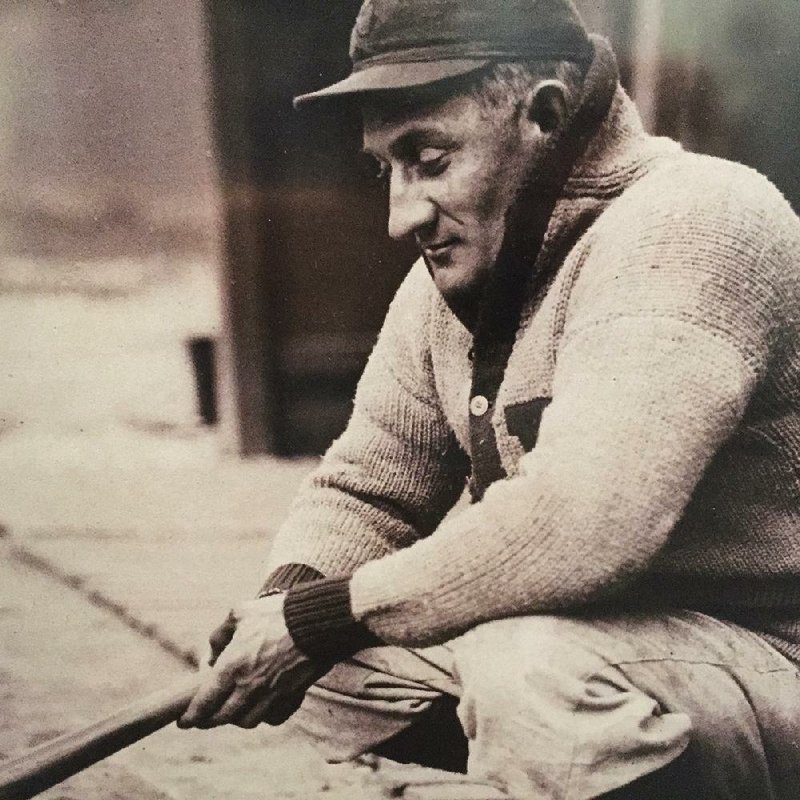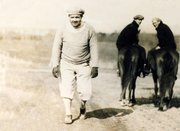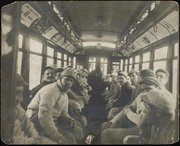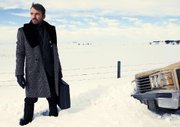Billy Bob Thornton never got his chance to play pro baseball.
After high school in the 1970s, the actor/screenwriter/director/musician did attend a Kansas City Royals tryout camp held in Little Rock. While he was waiting his turn to pitch, chatting with other hopefuls down the first base line, an errant throw smacked him in the upper chest, breaking his collarbone. And that was it for his baseball career.
"I guess I was pretty good," Thornton says over the phone from somewhere in northern California. "I couldn't hit, I was a pitcher with control and a pretty good slider. I think I might have had a chance."
Thornton was enjoying a brief break with his family after concluding a tour with the Boxmasters, the British Invasion-cum-Bakersfield Sound band he serves as drummer and vocalist. (A musician who famously worked as a roadie during the '70s and later played in the ZZ Top tribute band Tres Hombres, Thornton is also a songwriter with four solo albums to his credit. He once said he became a movie star "accidentally," and that music remains his chief passion.)
Thornton is calling to talk baseball, specifically about University of Arkansas at Fayetteville journalism professor Larry Foley's 57-minute documentary The First Boys of Spring, which will have its world premiere at the Hot Springs Documentary Film Festival at 11 a.m. Saturday at Horner Hall in the Hot Springs Convention Center. (For information on tickets and passes, see hsdfi.org.)
The film is an enlightening history of spring training in Hot Springs, which began in 1886 when A.G. Spalding brought his Chicago White Stockings (a team that later became the Cubs) down to train in the Spa City, and didn't peter out until the early '50s. (The Detroit Stars of the Negro Leagues were the last team to train in Hot Springs; their last season there was 1955, the year Thornton was born in the city.)
Thornton says he found the script engrossing. "I just wanted to keep on reading, the stories were just so good," he says. "I mean, Babe Ruth, all these Hall of Famers ... the combination of baseball and Hot Springs made it kind of a no-brainer for me. Like most of us from where I'm from, I'm a Cardinals fan."
He may be the highest profile Cardinals fan, having described himself as being to the team what Jack Nicholson is to the Lakers. Thornton developed a friendship with the team's longtime manager Tony LaRussa, who managed the Cardinals from 1996 to 2011 and now serves as the chief baseball officer for the Arizona Diamondbacks.
Foley's film relies heavily on archival footage and photographs, with a re-enactment of a 1912 game between the Pittsburgh Pirates and the Boston Red Sox staged in period costume at Little Rock's Lamar Porter Athletic Field to provide interstitial glue. In addition to Thornton, who serves as the main narrator, the film also employs Peter Coyote as the voice of Yankee pitcher Waite Hoyt and UA basketball coach Mike Anderson as the voice of Satchel Paige.
Those unfamiliar with Hot Springs' place in baseball history might be surprised to learn how large a role the city plays in the legend of Babe Ruth, who first came there in 1918 as a relatively svelte -- 194-pound -- left-handed pitcher for the Boston Red Sox. He was coming off a year which had established him as the best left-handed hurler in the American League, if not all of baseball. In 1917, he'd won 24 games and compiled an earned run average of 2.01. Most amazingly, he pitched a major league-leading 35 complete games in 38 starts.
In these pre-designated hitter days, Ruth had also had a very good year at the plate -- and not just for a pitcher. He'd hit .325, with two home runs, which brought his career total to nine.
Still, when the Red Sox opened spring training camp in 1918, there was no indication the team envisioned Ruth as anything other than the ace of a fine pitching staff that included Hall of Famer Herb Pennock and Carl Mays. When Ruth signed his yearly contract in January 1918 (for a princely $7,000), he boldly announced his intention to win 30 games in the 1918 season.
Then he hit what might be the most important home run in the history of baseball. On St. Patrick's Day, Ruth was inserted into the lineup in place of the Red Sox's injured first baseman. He hit a home run in the fourth inning, but that was just a warm-up. In the sixth inning, he hit a long ball that flew far over the right-field fence, clearing Whittington Avenue and landing in the still-extant Arkansas Alligator Farm and Petting Zoo.
There was a price to be paid for this prodigious blow. As Thornton points out in his narration, the notoriously cheap Red Sox owner Harry Frazee had taken to fining Ruth $10 for every baseball that he hit out of the park. "They ought to make the ... parks bigger," Thornton, as Ruth, says in his narration.
...
Thornton looks to be very busy with movie stuff in the next couple of years, with a long-rumored sequel to 2003's Bad Santa finally coming together. He'll be seen in David Gordon Green's Our Brand Is Crisis, a fictional film based on Rachel Boynton's 2005 documentary of the same name. (Interestingly, Thornton and co-star Sandra Bullock seem to be playing versions of political consultant James Carville in the film.) He's also playing the lead in David E. Kelley's Trial, a 10-episode legal drama that the Ally McBeal and Picket Fences creator is doing for Amazon Studios.
Like a lot of actors, Thornton has become increasingly disillusioned with the sort of movies Hollywood is producing and sees long-form television series as the most exciting place to work. He was nominated for an Emmy for his work as the maligned, fiercely intelligent antagonist Lorne Malvo in the first season of Fargo.
"They're not making the kind of movies that I grew up with anymore," he says when asked about any plans to write and direct. "I have very specific sorts of stories to tell and that's not where the business is headed now. But with a miniseries, what you're basically doing is making a 10-hour independent movie. "
I ask him whether his last directing effort, 2012's Jayne Mansfield's Car, might not have worked better as a series, and he seems to consider it.
"Probably," he says, "the movie really never had a chance. It didn't get good distribution and some of the reviews really didn't get it. I remember somebody wrote, 'It doesn't ever make up its mind whether it's a comedy or a drama.' And that's the whole point -- the movies I grew up with never had to decide whether they were drama or comedy, they were all dramas and comedies. They were serious, and they were funny."
That's what informs all of Thornton's work; there's always a mordant humor running through his serious roles, and a wonderful naturalism informing his comic ones. While he's not eager to talk about his "process" -- "it always sounds pretentious when actors talk about things like that; I generally just say I don't have one" -- he allows that he always manages to see himself in the role he's taken. While some actors might work from the outside in, affecting a limp and a hairstyle, Thornton imagines himself as the character.
"If I'm playing a hit man, I'm playing me as a hit man," he says. The words might be the screenwriter's but the cadences, rhythms and inflections are his. The result has been a remarkably interesting body of work. Even when he's stuck in thankless roles, he's always watchable.
"There're some parts I can't play," he says. "And I think that it's important for an actor to know who they are. Some guys, they don't want to play the bad guy, they don't want to play the goofball, they're always trying to force themselves into parts that don't suit them."
Thornton isn't complaining. He has made a good life in the movies, even if he didn't set out to be an actor. He has his band, and there are other perks.
In September, before a Boxmasters show in Scottsdale, Ariz., Thornton and fellow band member and songwriting partner J.D. Andrew dropped into the Texas Rangers training facility in nearby Surprise. While Thornton says they expected to be shown around and maybe talk to some of the Ranger prospects, the team surprised them with full uniforms. Thornton ended up pitching a bullpen session.
He says he's lost a little off his fastball, but he's still got that sneaky slider.
Email:
pmartin@arkansasonline.com
www.blooddirtangels.com
MovieStyle on 10/09/2015



